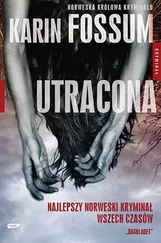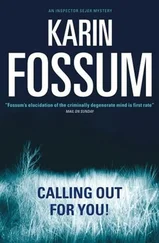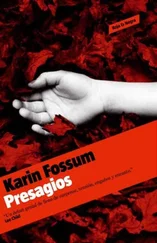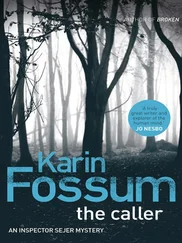He started to think about the recurring dizzy spells again. I’ll have to bite the bullet, he thought, and haul my decrepit body off to the doctor. It’s all downhill from here. Then I’ll have to endure a whole raft of tests and the nerve-racking wait. Maybe there really is something terribly wrong with me, and life as I’ve known it until now is — well, maybe it’s over. The word cancer popped up in his thoughts again, thoughts that would not let him be. He suddenly felt the need for moral support and dialed the number of his daughter Ingrid, to tell her about the incident at Damtjern.
“Hi, Ingrid, it’s me. Yes, I’m in the car. Yes, yes, I’m using the hands-free; don’t be silly. We’ve found a little boy. He was lying in a pond up by Granfoss. His mother found him by the jetty. Just over a year. It’s so sad. Yes, exactly, I’m on my way to the station. I’m going to talk to the parents. Maybe I’ll drop by afterward, if that’s all right?”
“Yes,” she said. “Of course that’s all right. And how are you otherwise, Dad?”
She meant the dizziness. He said he was sure it would pass and it was just a matter of patience. But she wasn’t going to let him get away with such a vague answer.
“It’ll pass? Don’t give me happily ever after; I’m too old for that. I know you,” she continued, “you’re not telling me everything. But you don’t need to spare me; remember that I’ve been through a lot. And just so you know, I can stomach the truth.”
She was referring to her stint as a nurse in war-torn Somalia with her husband, Erik, who specialized in acute medicine. When they came back home, after working there for several years, they had a boy with them. Sejer’s only grandchild was now a promising young dancer with the National Ballet School.
“OK,” he said. “I promise, I won’t spare you. And yes, I am still dizzy. I mean, every now and then. But I promise I’m going to do something about it, once and for all.” He was at the railroad crossing in the center of town, and the barrier was down. While he sat and waited for the train to pass, he thought about the little boy again. What Skarre had said was right. If this was actually murder, and it was the mother who had done it, she would get off lightly. That special bond between mother and child, so many mitigating circumstances, so many possible explanations. Non compos mentis, he thought, not of sound mind. Personality disorders, psychosis, depression, and other complaints. There was so much to choose from. A freight train with dark red cars finally thundered past. He listened to the steady rhythm of the wheels and the rattling of iron and metal, and he counted the cars, as he had done since childhood.
He could not help but think of a dandelion head with its delicate white pappi, because her hair was almost as white as snow. He was also struck by how slight she was, thin and fragile as a twig. A child with a child, he thought. It was incredible that she had managed to give birth to a baby at all.
“Come with me,” he said in a reassuring voice. “Let’s go to my office; it’s just a bit farther down the corridor.”
She got to her feet and then saw the dog. Frank stood up on his hind legs, wanting to say hello. She stroked him gingerly on the head, but she seemed to be elsewhere. The catastrophe had drained her of color and she had dark rings under her eyes.
“If he bothers you, I’ll put him in the car,” Sejer said. “But usually he settles down; he doesn’t normally make a fuss.”
She shook her head. But she did keep looking at the dog, as if he touched something in her, some longing.
“What is your name?” he asked as kindly as he could, as they walked down the corridor.
“Carmen,” she replied. “Carmen Cesilie Zita.”
Her name sounded familiar. And before he could ask, she had given him the answer.
“Yes,” she said, as though reading his thoughts. “My father owns the fast-food place in Torggata. The one called Zita Quick. He’s had it for ten years, and we both work there. Well, I don’t really at the moment because Tommy’s still so little. But Nicolai does shifts there. We’re open all night.”
She paused and looked at Sejer with blue eyes surrounded by thick black lashes. “People come all the way from Oslo for our food,” she said proudly.
He opened the door to his office. Frank slipped in, went over to the blanket by the window, and lay down.
“Please, find yourself a chair,” he told her.
He studied the slight girl.
“My condolences, Carmen,” he added. “It’s terribly sad.”
He wanted to be friendly. Wanted to do everything right, in case she wasn’t guilty.
“Why can’t I be with Nicolai?” she asked. But the question was also a complaint and she sounded petulant. You don’t just plow your way into someone else’s life; you tiptoe in with care and respect. So he weighed his words carefully. He had considerable training.
“You have to be separated, as a matter of procedure,” he explained patiently. “I can understand if you might find it a bit brutal, but we automatically follow lots of rules and regulations, so there is absolutely no need to worry about it. We’re going to talk together for a while, and then afterward you can both go home to Granfoss. Oh, I see you didn’t take your mineral water with you. Shall I get you another one?”
She shook her head and sat down in a chair by the window. She wasn’t interested in the view; her eyes were fixed on her hands, which she had folded in her lap. But she glanced over at Frank every now and then. The dog lying on the gray blanket was obviously soothing.
“What was your little boy’s name?” he asked. “Tommy?”
He rolled his chair across the floor and sat down beside her.
“Yes, his name is Tommy Nicolai.”
She started to cry. And while she cried, he sat and waited patiently until the outburst was over.
“Now, let’s go through it all again,” he said. “Step by step. Exactly as it happened. You can tell me your own way, if you like. Or if you think that’s difficult, I can ask you questions.”
“Maybe you should ask questions,” she said. “Everything’s just chaos; it’s so hard to remember.”
“I understand,” Sejer assured her. “I’ll ask you questions then. Now tell me about the day. What were you doing when you discovered that Tommy had disappeared?”
He could see that she was rifling through her memory; her eyes darted around the room, returning to Frank again, who had fallen asleep on his blanket.
“Well, it was getting on for supper time. I’d decided we were going to have salmon. So that’s probably what I was doing, preparing the fish.”
“Probably? You’re not sure?”
“Yes, of course I’m sure. Don’t talk to me like I’m some stupid little girl.”
But she paused and didn’t seem certain at all. Sejer reminded himself that she was most likely in shock, so her memory would have gaps; he’d seen it before. Likewise, angry words would spill over in the heat of the moment.
“Do you feel uncertain, Carmen?” he asked again.
“The whole day is just a blur,” she said curtly. She wrung her hands. She was on guard; he knew the signs.
“And Tommy’s dad? What did you say his name was?”
“Nicolai Brandt. And we’re married. I know what you’re thinking, that we’re young and silly, and we lack judgment.”
“Not at all,” he said. “I would never think that. Where was Nicolai when it happened? Tell me.”
“He was down in the cellar repairing some old bikes. He earns a bit of money doing simple repairs and gets quite a few jobs. He loves messing around with bikes; he’s obsessed. So he wasn’t there when it happened. I was alone in the kitchen and Tommy was sitting on a blanket on the floor. He had no clothes on because it was so hot and I wanted him to get some air. He often gets very sweaty. I’d opened the back door to get a draft through.”
Читать дальше












